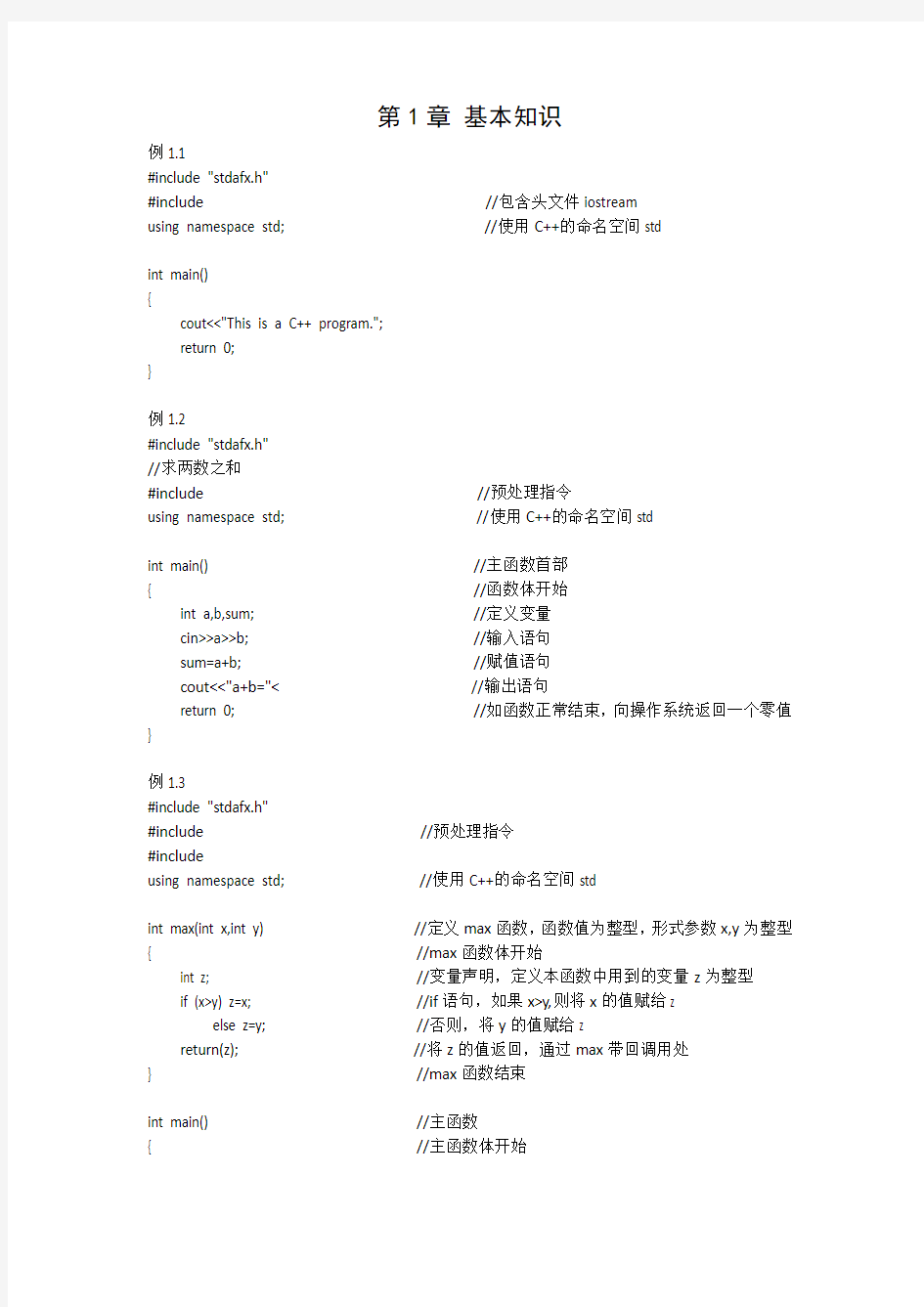

第1章基本知识
例1.1
#include "stdafx.h"
#include
using namespace std; //使用C++的命名空间std
int main()
{
cout<<"This is a C++ program.";
return 0;
}
例1.2
#include "stdafx.h"
//求两数之和
#include
using namespace std; //使用C++的命名空间std
int main() //主函数首部
{ //函数体开始
int a,b,sum; //定义变量
cin>>a>>b; //输入语句
sum=a+b; //赋值语句
cout<<"a+b="< return 0; //如函数正常结束,向操作系统返回一个零值} 例1.3 #include "stdafx.h" #include #include using namespace std; //使用C++的命名空间std int max(int x,int y) //定义max函数,函数值为整型,形式参数x,y为整型{ //max函数体开始 int z; //变量声明,定义本函数中用到的变量z为整型 if (x>y) z=x; //if语句,如果x>y,则将x的值赋给z else z=y; //否则,将y的值赋给z return(z); //将z的值返回,通过max带回调用处 } //max函数结束 int main() //主函数 { //主函数体开始 int a,b,m; //变量声明 cin>>a>>b; //输入变量a和b的值 m=max(a,b); //调用max函数,将得到的值赋给m cout<<"max="< getch(); return 0; //如函数正常结束,向操作系统返回一个零值 } //函数结束 或 #include "stdafx.h" #include #include using namespace std; //使用C++的命名空间std int main() //主函数 { //主函数体开始 int max(int x,int y); int a,b,m; //变量声明 cin>>a>>b; //输入变量a和b的值 m=max(a,b); //调用max函数,将得到的值赋给m cout<<"max="< getch(); return 0; //如函数正常结束,向操作系统返回一个零值 } //函数结束 int max(int x,int y) //定义max函数,函数值为整型,形式参数x,y为整型{ //max函数体开始 int z; //变量声明,定义本函数中用到的变量z为整型 if (x>y) z=x; //if语句,如果x>y,则将x的值赋给z else z=y; //否则,将y的值赋给z return(z); //将z的值返回,通过max带回调用处 } //max函数结束 例1.4 #include "stdafx.h" #include #include using namespace std; //使用C++的命名空间std class Student //声明一个类,类名为student { private: //以下为类的私有部分 int num; //私有变量num int score; //私有变量score public: //以下为类的公用部分 void setdata() //定义公用函数setdata { cin>>num; //输入num的值 cin>>score; //输入score的值 } void display() //定义公用函数display { cout<<"num="< cout<<"score="< }; }; //类的声明结束 Student stud1,stud2; //定义stud1,stud2为student类的变量 int main() //主函数首部 { //主函数体开始 stud1.setdata(); //调用对象stud1的setdata函数 stud2.setdata(); //调用对象stud2的setdata函数 stud1.display(); //调用对象stud1的setdata函数 stud2.display(); //调用对象stud2的display函数 getch(); return 0; //如函数正常结束,向操作系统返回一个零值} //函数结束 习题7 #include "stdafx.h" #include #include using namespace std; //使用C++的命名空间std int main() //主函数首部 { //主函数体开始 int a,b,c; int f(int x,int y,int z); cin>>a>>b>>c; c=f(a,b,c); cout< getch(); return 0; } int f(int x,int y,int z) { int m; if(x else m=y; if(z return(m); } 习题9 #include "stdafx.h" #include #include using namespace std; //使用C++的命名空间std int main() //主函数首部 { //主函数体开始int a,b,c; cin>>a>>b; int add(int x,int y); c=add(a,b); cout<<"a+b="< getch(); return 0; } int add(int x,int y) { int z; z=x+y; return(z); } 习题10 #include "stdafx.h" #include #include using namespace std; //使用C++的命名空间std int main() //主函数首部 { //主函数体开始void sort(int x,int y,int z); int x,y,z; cin>>x>>y>>z; sort(x,y,z); getch(); return 0; } void sort(int x,int y,int z) { int temp; if(x>y) { temp=x; x=y; y=temp; } if(z { cout< } else if(z cout< else cout<